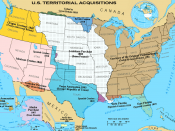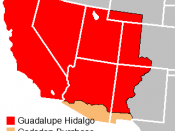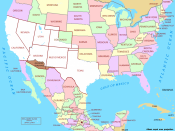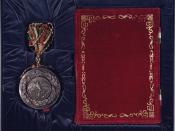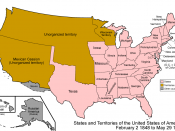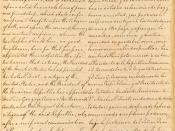The United States advocated a philosophy called the Manifest Destiny in order to justify its imperious desires, no matter how unjust and/or cruel they were. The leaders of the U.S. claimed that it was our fate to expand our borders so that they would reach from the Atlantic to the Pacific Ocean. Some even went so far as to say that it is GodÃÂs will that we do so. The resulting policies made and actions taken during the Manifest Destiny were a forced treaty with Mexico through which we gained much of their land, a small-scale war between settlers of Maine versus some New Brunswick (Canadian) lumberjacks, and a conflict with our strongest, most threatening rival, Great Britain. The benefits from each action taken that reflected the views of the Manifest Destiny came at the expense of someone else.
The Mexican War is perhaps the largest consequence of the Manifest Destiny. Americans came to Texas for its rich and retile lands, and eventually rebelled against the Mexican authorities. After these new Texans declared independence and set up their own government, the United States decided to annex the territory. This might have been a strategic move to force Mexico to declare war on the United States, because Mexico did declare war, and ended up being crushed and forced to sign a very unfavorable treaty. This Treaty of Guadalupe Hidalgo was very beneficial for the United States, for it purchased the U.S. California, Nevada, Utah, and parts of Colorado, Arizona, New Mexico, and Wyoming for a mere $15 million. This treaty increased the United StatesÃÂ size by about 20%.
Because of the imperialistic attitudes in the US, we went through conflicts over northern territory as well. In the Northeast, Maine settlers fought the Aroostook War against New Brunswick lumberjacks who wanted to cut down trees in the Aroostook River Valley. Eventually, we signed a treaty with the Canadians declaring a proper boundary for Maine, getting as much land for ourselves as we could. Though Britain shared rights to the Oregon Territory along with the United States, American settlers really wanted the rich land for themselves (the common saying was ÃÂ Fifty-Four Forty or Fight!ÃÂ). We finally split the Oregon Territory with Great Britain along the 49th parallel, which still legally expanded the U.S. by a great deal.
Some claimed that it was the word of God that mandated the United States should expand its borders. Some even added to this by saying that the United States shall someday encompass all of North America! The United States tried to justify its imperialism by many different ways. It was said that the people whose lands were annexed were very poorly off before the United States. The most common argument was that we were bringing ÃÂliberty, democracy, and the word of GodÃÂ to those whose lands we took. Of course, the people who said that ignored the death and destruction that came along with things like the ÃÂword of GodÃÂ to the original settlers of those territories.
Though The Manifest Destiny brought the United States mcuh land and opportunities, it always did so at the expense of the landÃÂs previous inhabitants. The land treaties we got other countries to sign were very much in our best interests. In the case of the Treaty of Guadalupe Hidalgo, we literally forced the Mexicans to accept unfair conditions. The treaties signed with Britain and New Brunswick took a little less violence on our end (especially the Oregon Territory treaty), but still got enough new land to feed our expansionist appetites. The Manifest Destiny as a philosophical idea made us more greedy for new acquired land, and got us to rationalize this land seizure to ourselves.
Bibliography:American Past and Present, AP Edition, Seventh EditionWikipedia contributors. "Manifest Destiny." Wikipedia, The Free Encyclopedia. Wikipedia, The Free Encyclopedia, 1 Mar. 2010. Web. 2 Mar. 2010.
